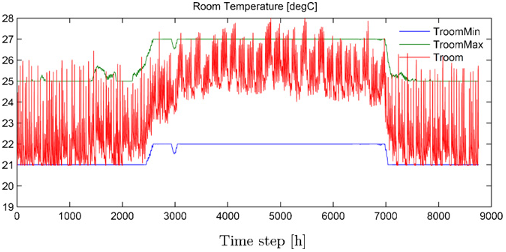Q1. What have the authors contributed in "Use of model predictive control and weather forecasts for energy efficient building climate control" ?
This paper presents an investigation of how Model Predictive Control ( MPC ) and weather predictions can increase the energy efficiency in Integrated Room Automation ( IRA ) while respecting occupant comfort. In this paper it is reported on the development and analysis of a Stochastic Model Predictive Control ( SMPC ) strategy for building climate control that takes into account hance-constrained control the uncertainty due to the use of weather predictions. As first step the potential of MPC was assessed by means of a large-scale factorial simulation study that considered different types of buildings and HVAC systems at four representative European sites. The findings suggest that SMPC outperforms current control practice.





